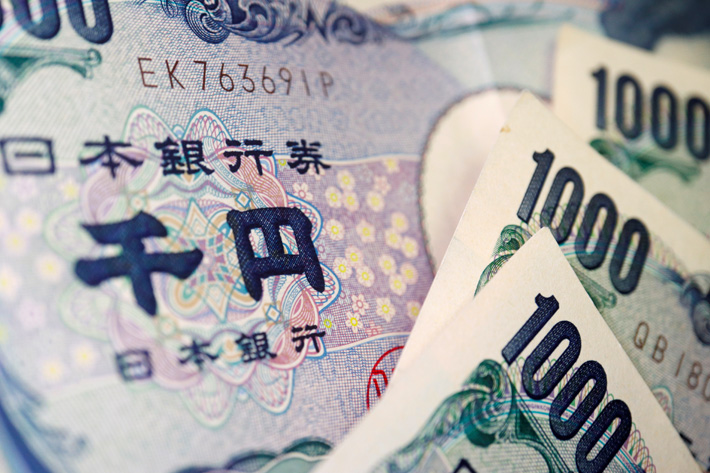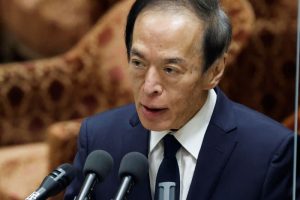Japanese policymakers continued efforts to tame sharp falls in the yen on Monday, via what appeared to be a second straight day of intervention in the forex market – but it failed to prop up the currency against the soaring dollar.
The yen’s sell-off is hurting the world’s third-largest economy by driving already surging import bills and challenges the Bank of Japan’s commitment to ultra-low rates in the face of rapid global monetary tightening to combat rampant inflation.
The Japanese currency jumped 4 yen to 145.28 per dollar in early Asia trade on Monday, suggesting authorities had stepped in for a second straight day after a similar move by Tokyo on Friday.
“We won’t comment,” Masato Kanda, vice finance minister for international affairs, told reporters at the Ministry of Finance (MOF), when asked if they intervened again on Monday.
“We are monitoring the market 24/7 while taking appropriate responses. We’ll continue to do so from now on as well,” said Kanda, who oversees Japan’s exchange-rate policy.
However, the yen failed to cling to early gains and briefly hit a low of 149.70 per dollar, as markets continued to focus on the widening divergence between the Bank of Japan’s ultra-easy monetary policy and steady rate hike plans by the US Federal Reserve. It last stood around 148.80.
ALSO SEE:
Japan’s Imports Surge 45% to Record High on Weakened Yen
About $36bn Spent on Friday
“In the past crises involving British pound and Italy’s lira, authorities have ended up failing to defend their currencies. Likewise, Japan’s stealth intervention only has limited effects,” Daisaku Ueno, chief FX strategist at Mitsubishi UFJ Morgan Stanley Securities, said.
“Strength in the dollar is the biggest factor behind the weak yen. If the United States shows signs of its rate hikes peaking out and even cutting interest rates, the yen would stop weakening even without intervention.”
Japan is likely to have spent a record 5.4-5.5 trillion yen (more than $36.2 billion) in its yen-buying intervention last Friday, according to estimates by Tokyo money market brokerage firms.
That is much bigger than the roughly 2.8 trillion yen Japan spent supporting the currency on September 22, which was the first yen-buying, dollar-selling intervention since 1998.
Spotlight on BOJ Policy
The yen’s plight puts the BOJ under the spotlight as it meets for a two-day rate meeting ending on Friday, when it is widely expected to maintain ultra-loose monetary policy.
With inflation relatively modest and the economy unable to move into a faster gear, the central bank is wary of raising rates and risk triggering a recession.
“It’s extremely undesirable” that Japan’s real wages, adjusted for inflation continue to fall, BOJ Governor Haruhiko Kuroda told parliament on Monday.
“It’s desirable for inflation to stably achieve our 2% target accompanied by wage rises,” Kuroda said, stressing the need to keep supporting the economy with ultra-low rates.
The Fed, which meets the following week, is widely expected to hike rates again as it focuses on fighting red-hot inflation.
The widening US-Japanese rate differential is likely to keep downward pressure on the yen, which has fallen more than 20% against the dollar this year.
Japanese authorities confirmed that they stepped into the market when it intervened on September 22. Since then, authorities have remained silent on whether they made any further attempts to support the currency including on Friday, when Tokyo likely conducted stealth intervention.
At $1.33 trillion, Japan’s foreign reserves provide it with enough fire power to intervene many more times, but traders doubt that Tokyo will be able to reverse the yen’s downtrend on its own.
Finance Minister Shunichi Suzuki repeated that excessive currency moves were undesirable.
“We absolutely cannot tolerate excessive moves in the foreign exchange market based on speculation,” he told reporters at the finance ministry. “We will respond appropriately to excess volatility,” he said, a view echoed by Prime Minister Fumio Kishida in parliament later on Monday.
Inflation Forecasts May be Revised
Some market participants speculate the BOJ could tweak its dovish policy guidance amid growing public discontent over the weak-yen effect of its ultra-loose monetary policy.
In fresh quarterly projections due on Friday, the BOJ is expected to slightly revise up its consumer inflation forecasts for the year ending in March 2023 and the following year, said five sources familiar with the bank’s thinking.
The upgraded forecast will still show core consumer inflation sliding below the BOJ’s 2% target next fiscal year as the impact of one-off factors, such as past rises in fuel costs, dissipate, the sources said.
The board will likely cut its growth forecasts for the current and following fiscal years, as global recession fears cloud the outlook for the export-reliant economy, they said.
Investors’ attention will be focused on Governor Haruhiko Kuroda’s post-meeting briefing for his views on the economic fallout from the yen’s sharp declines, and clues on the timing of an eventual exit from the ultra-loose policy.
In July, the BOJ forecast core consumer inflation to hit 2.3% in fiscal year 2022 before slowing to 1.4% the following year. It projects the economy to expand 2.4% in the current fiscal year and rise 2% in fiscal 2023.
- Reuters with additional editing by Jim Pollard
ALSO SEE:
Yen Sinks Below 150 to Dollar, Market Watch for Intervention
Japan Repeats Readiness to Back Yen as it Hits 32-Year Low
Japanese Yen Jumps After Rare Forex Intervention
Japanese Inflation Close to 8-Year High, Over BOJ Target
Why Japan Has Fallen Out of Love With a Weak Yen
























